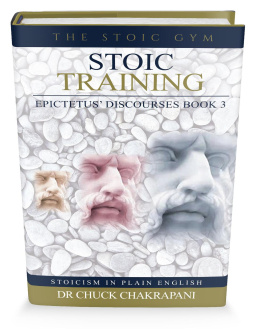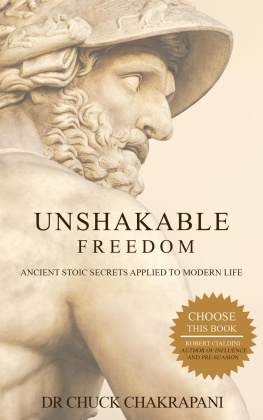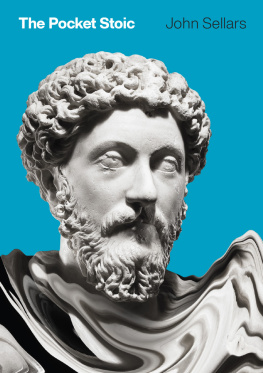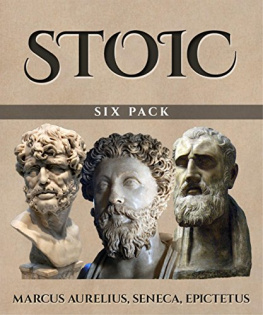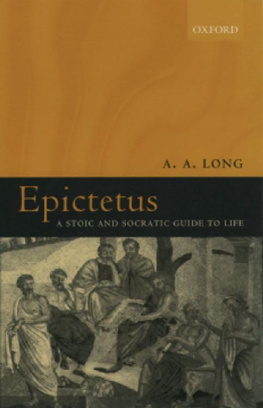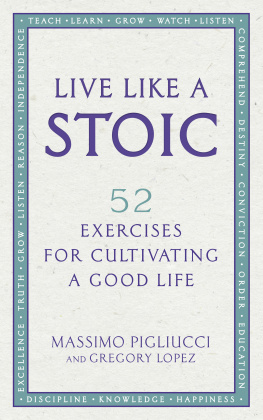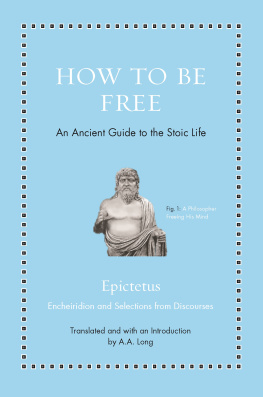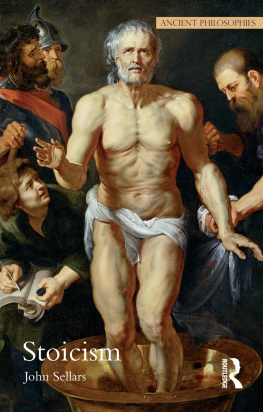Stoic Training
Epictetus Discoures Book 3
Stoicism in Plain English
Dr. Chuck Chakrapani
The Stoic Gym Publications
Copyright 2017 by Chuck Chakrapani
All rights reserved. No part of this publication may be reproduced, distributed or transmitted in any form or by any means, including photocopying, recording, or other electronic or mechanical methods, without the prior written permission of the publisher, except in the case of brief quotations embodied in critical reviews and certain other noncommercial uses permitted by copyright law. For permission requests, write to the publisher, addressed Attention: Permissions Coordinator, at the address below.
Stoic Gym Publications
www.thestoicgym.com
Ordering Information:
Quantity sales. Special discounts are available on quantity purchases by corporations, associations, and others. For details, contact the Special Sales Department at the address above.
Stoic Foundations/Chuck Chakrapani. 1st ed.
ISBNs:
Print: 978-0-920219-32-4
ePub: 978-0-920219-33-1
Mobi: 978-0-920219-34-8
PDF: 978-0-920219-35-5
17 18 19 20 21 22 23 24 25 261 2 3 4 5 6 7 8 9 0
Contents
Basic Principles
T his is the third book of Epictetus Discourses. The first book, Stoic Foundations , discusses the basic themes of Stoicism. In his second book, Stoic Choices , Epictetus discusses what a Stoic should do when faced with choices in different contexts
In this third book, Stoic Training , Epictetus talks about how Stoics may progress in their training.
Stoic Training: A quick outline
Like the first two books, Stoic Training revolves around a limited number of themes. These themes are reprised not only in this book, but in other (Discourses) books as well. These are some of the basic disciplines discussed in this book:
- Stoic training aims to make you excellent as a human being . What makes a horse or a lion excellent does not make a human being excellent. The excellence of a horse or a lion is not the excellence of a human being. For human beings to be excellent, they should excel in their choices. When you start training, keep away from temptations, and keep the right company until your mind gets strong. [1, 12, 16]
- Stoic training consists of three disciplines: desire, action, and assent.
- Dealing with desires and aversions [the Discipline of Desire] : To always get what you desire and never get what you want to avoid.
- Dealing with choices to act or not to act [The discipline of action]: To always act appropriately. Not to act carelessly but in an orderly fashion after due consideration.
- Dealing with judgment [The discipline of assent]: To avoid error and hasty judgment. [2, 12]
- Stoic training consists only of dealing with ones choices. Train yourself to ignore and not judge whatever is not your choice. The final aim is to assent to what is true, dissent from what is false, and suspend judgment when uncertain; similarly, to desire what is good, to reject what is bad, and be indifferent to what is neither. [3]
- Train your mind to want whatever actually happens . This way youll never be disappointed no matter what happens. Keep your goals always in mind. Train yourself daily to deal with impressions. It is our judgement that decides whether what happens to us is good or bad. Make sure that your judgments are sound. [4, 5, 8, 9]
- Stoic training means to prepare ourselves for the challenges to come . Illness and death are part of reality. There is no occasion for anger or fear . You are not desolate merely because you are alone, any more than you are secure from desolation because you are in a crowd. Train to be self-sufficient and be comfortable with yourself as well as with others. [10, 13]
- Ascetic training is unnecessary unless it serves some purpose . Avoid unnecessarily harsh training. Practice getting rid of diffidence and conceit. If you decide to pursue anything, make sure you are prepared to do what it takes. Not everyone is cut out to do everything. [14, 15]
- Train to see things as they are without adding your judgements to them . When you see things like poverty, dont add your judgment to it that it is bad. If you see people who have what you dont have, dont envy them. They paid a price for what they have. [17]
- Your judgements are the sole cause of your distress, because nothing outside of you can harm you . You can spot an advantage even in things others consider bad, such as illness and death. [18, 19, 20]
- Dont imitate others without understanding the basis of their actions . You should first master the principles. Approach things with caution and respect. Be aware of your limitations. Show your mastery by the way you act and not by blindly imitating others. [21]
- Train to be at home wherever you are . Things are impermanent. Dont long for the past. Train yourself to be at home wherever you are and whoever you are with. Do what needs doing and dont complain. This is where happiness is. It is impossible to be happy and yet crave what one doesnt have. Happiness must already have all it wants. It must resemble a person who has achieved their fill, feeling neither hungry nor thirsty. [24]
- Your goal is happiness and good fortune. Never be beaten. If you dont achieve it at one attempt, try again and again. But dont make failure a habit. [25]
- Confront your fear of death. You will see it is the fear of death rather than death that is the cause of your problem. [25, 26]
References
- The numbers in square brackets in this section refer to the discourse number.
- The letters after specific quotes in the book refer to the translators. They also happen to be the sources I relied on most often.
- [WO] William A. Oldfather
- [RD] Robert Dobbin, Penguin Classics
- [CG/RH] Christopher Gill (ed.)/Robin Hard, Everyman
- [RH] Robin Hard, Oxford Worlds Classics
- [GL] George Long, Delphi Classics
- Any other text in square brackets is not part of the original text, but inserted by me for clarification or as a commentary. I have chosen this method to avoid readers going back and forth between the text and end notes.
- The first and last sections ( Key ideas of this discourse and Think about this) are set in italics to remind readers that they are not a part of the original text but are added by me to reinforce the ideas of the discourse.
Discourse 1
Your Choices Shape Your Excellence
Key ideas of this discourse
- What makes an animal excellent does not make a human being excellent.
- Your superiority as a human being comes from your ability to reason.
- Adorn yourself as befits a human being.
- Your beauty comes from the nature of your choices.
The excellence of an animal is not the excellence of a human
A richly dressed rhetoric student with an elaborate hair style came to Epictetus. Epictetus asked the student:
Tell me, dont you think that some dogs and horses are beautiful? And, in general, is this not true of all animals?
Yes, it is.
Is this also not true of human beings some are beautiful, others ugly?

